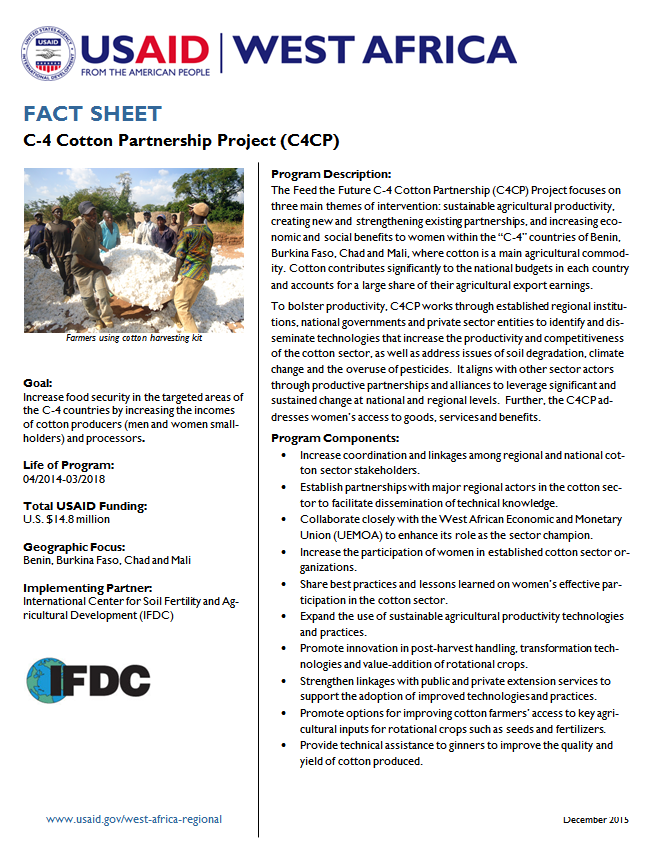C-4 Cotton Partnership Project (C4CP) ![]() (pdf - 145k)
(pdf - 145k)
Goal:
Increase food security in the targeted areas of the C-4 countries by increasing the incomes of cotton producers (men and women smallholders) and processors.
Life of Program:
04/2014-03/2018
Total USAID Funding:
U.S. $14.8 million
Geographic Focus:
Benin, Burkina Faso, Chad and Mali
Implementing Partner:
International Center for Soil Fertility and Ag-ricultural Development (IFDC)
Program Description:
The Feed the Future C-4 Cotton Partnership (C4CP) Project focuses on three main themes of intervention: sustainable agricultural productivity, creating new and strengthening existing partnerships, and increasing economic and social benefits to women within the “C-4” countries of Benin, Burkina Faso, Chad and Mali, where cotton is a main agricultural commodity. Cotton contributes significantly to the national budgets in each country and accounts for a large share of their agricultural export earnings.
To bolster productivity, C4CP works through established regional institutions, national governments and private sector entities to identify and disseminate technologies that increase the productivity and competitiveness of the cotton sector, as well as address issues of soil degradation, climate change and the overuse of pesticides. It aligns with other sector actors through productive partnerships and alliances to leverage significant and sustained change at national and regional levels. Further, the C4CP addresses women’s access to goods, services and benefits.
Program Components:
• Increase coordination and linkages among regional and national cot-ton sector stakeholders.
• Establish partnerships with major regional actors in the cotton sec-tor to facilitate dissemination of technical knowledge.
• Collaborate closely with the West African Economic and Monetary Union (UEMOA) to enhance its role as the sector champion.
• Increase the participation of women in established cotton sector organizations.
• Share best practices and lessons learned on women’s effective par-ticipation in the cotton sector.
• Expand the use of sustainable agricultural productivity technologies and practices.
• Promote innovation in post-harvest handling, transformation tech-nologies and value-addition of rotational crops.
• Strengthen linkages with public and private extension services to support the adoption of improved technologies and practices.
• Promote options for improving cotton farmers’ access to key agri-cultural inputs for rotational crops such as seeds and fertilizers.
• Provide technical assistance to ginners to improve the quality and yield of cotton produced.








Comment
Make a general inquiry or suggest an improvement.